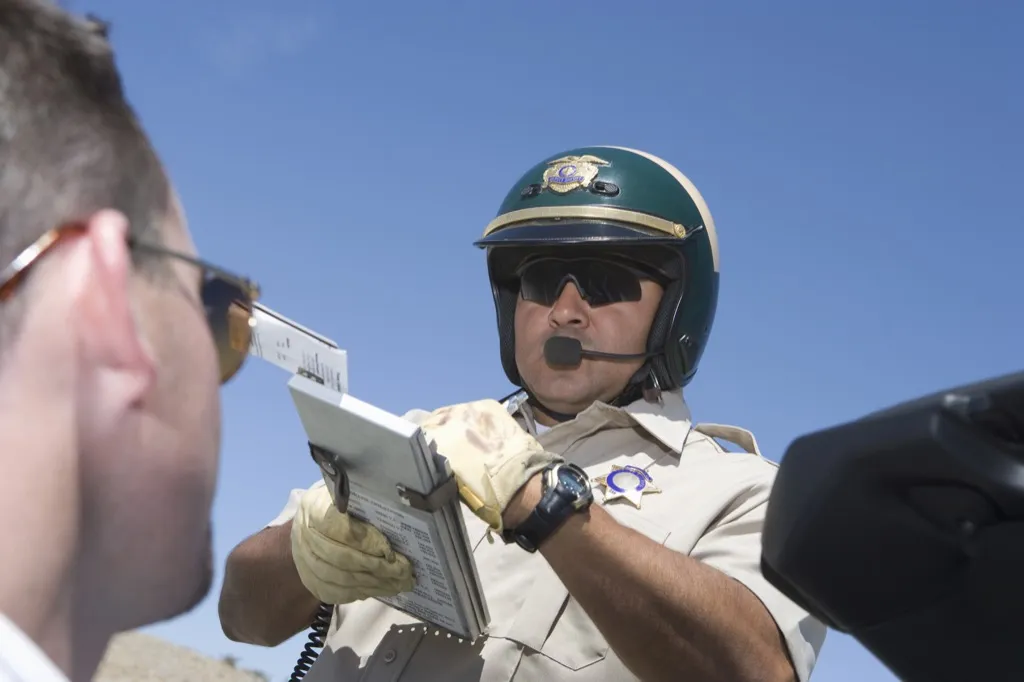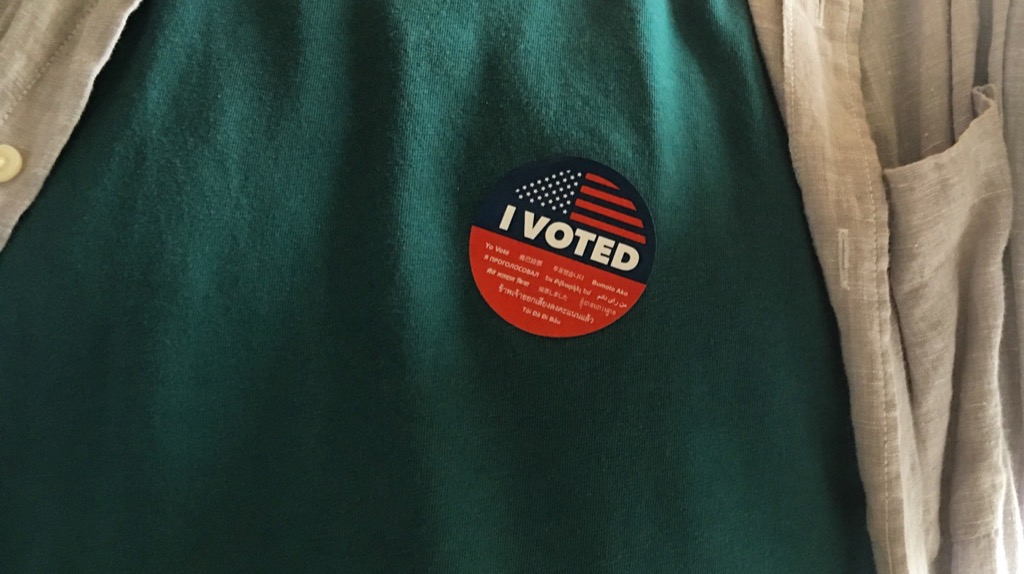17 Rights You Never Knew You Had

Dealing with law enforcement is stressful. But do you know what makes standing up for your rights even stressful? Not knowing their full extent. “It’s not always the sexiest topic, but it is really important for people to understand their rights and be able to use them accordingly,” says Caitlin Hoff, a health and safety investigator at ConsumerSafety.org.
The fact is, if you don’t know your rights, they’re likely to be trampled. But how many rights could really be going unnoticed? After all, we’ve all seen Law & Order. According to Jason Swindle, a criminal defense attorney at Swindle Law Group, a lot: “There are thousands of important rights that people do not know about,” he explains.
Rest assured, we’ve rounded up the most important ones to memorize. After all, you never know what kind of jam they could get you out of.
1
The Right to Not Divulge Your Passwords

“A legal right that is often overlooked is the right to not give law enforcement your password for your phone, laptop, garage code, etc.,” says Seth Morris, a criminal defense attorney at Berry Law Firm. “Although there are a few caveats, it comes down to the Fifth Amendment’s protection against self-incrimination,” he explains.
Because information from your device could incriminate you—and providing your password is considered testimony—police can not force you to self-incriminate by requiring you give up your password.
You should be warned, however, that this does not apply to facial recognition or thumbprint technology. Because these are a feature of your appearance and not your mind, “they are not considered testimonial acts and do not violate the Fifth Amendment,” Morris says.
2
The Right to a Timely Search

A search warrant is not a blank check given to police to rifle through your things whenever they see fit. In fact, it has some rather strict boundaries. “A search warrant must be executed within 10 days of its issuance or it becomes void,” says Jo-Anna Nieves, a criminal defense attorney at The Nieves Law Firm.
In addition, “it may only be executed between the hours of 7 a.m. to 10 p.m. unless the judge finds a good reason to authorize service at other times.” Now if only your boss had such genteel manners when it came to unannounced requests for your cooperation.
3
The Right to Discontinue an Authorized Search

Just because you gave authorities the OK to search your things doesn’t mean you have to allow them to carry their search to its conclusion. In fact, “if you agree to allow the police into your home you can ask them to leave at any time and they will have to discontinue the search,” says Patrick Barone, criminal defense attorney at the Barone Defense Firm.
4
The Right to Refuse Questioning

So you got pulled over and the officer is asking you some basic questions. You might want to keep your mouth shut, even if they seem harmless. “Most people are unaware that they have the right to refuse to answer any questions from a police officer when they get stopped for a minor traffic violation or any other reason,” says Gary Medlin, defense attorney at The Medlin Law Firm. In fact, you “don’t have to tell the office where you are going, where you have been, or whether you have had anything to drink.”
Instead, you can simply tell the officers you invoke your 5th Amendment right to remain silent. Not only can they not hold it against you, but they may also even let you go sooner as a result. Given that they can not fruitfully ask further questions, “the officer may have no reason to detain the person any longer,” he explains.
5
The Right to Refuse a Search

Yup, you read that correctly. “Most people also don’t realize that they can refuse a request to search their vehicle,” says Medlin. However, you “should always refuse any request by an officer to search your car or anything else,” he advises.
If the officer continues searching despite your protest, any evidence they find will be dismissed. The search, meanwhile, will have become illegal—and subject to punishment.
6
The Right to Not Provide An ID

“If an officer asks for an ID, such as a driver’s license, a citizen does not have to produce any form of government identification unless they are driving,” says Medlin.
Instead, all you have to do is provide your name, date of birth, and address—verbally. “There is no law in our country or any state that requires citizens to have any physical form of identification,” he explains.
7
The Right to Record a Traffic Stop

While it’s probably not a great choice to obnoxiously shove a camera in anyone’s face, you are entitled to film a police encounter. “If you want to record a traffic stop on your phone, you have that right,” says criminal defense attorney Matthew Aulsbrook of Aulsbrook Law Firm.
Just be sure to notify the authorities beforehand, as “an unfamiliar handheld device can easily be mistaken for a weapon when unexpectedly pointed at someone,” he warns.
8
The Right to Leave

“Many people mistakenly believe they have to remain put if a police officer asks them to,” says Matt C. Pinsker, a former prosecutor and adjunct professor at the L. Douglas Wilder School of Government and Public Affairs. However, in order to detain someone without handcuffing them, police need to have a “reasonable suspicion of unlawful conduct.” Without it, you’re free to go—even if it be to their dismay.
If you’re not sure at the moment of your right but are itching to go, he recommends a simple solution: “just ask the officer.”
9
The Right to Leave Your Car Window Up

“A person has a right not to roll down their window completely when pulled over by a cop,” says David Reischer, an attorney and CEO of LegalAdvice. Especially if you feel your breath may incriminate you at a traffic stop, you may leave the barrier largely up. “A person must only roll their window sufficient to fit the license, registration, and insurance through,” he explains.
10
The Right to Panhandle

“One of the little-known legal rights is in regards to panhandling,” says Tony Pagliocco, commissioner of the city council ethics board in Federal Way, Washington. Despite many cities trying to eliminate this sidewalk activity, it’s actually protected by the First Amendment’s free speech clause, he explains.
As a result, municipalities are moving to pass traffic safety laws and other ways to evade respecting this right. In the meantime, however, you’re protected, as “numerous ordinances have been overturned on free speech rights,” he explains.
11
The Right to Refuse a Field Sobriety Test

“The most widespread misconception [about rights] is that when a driver is pulled over and investigated for DUI, he or she must conduct a field sobriety test,” says Swindle. Yet despite his own clients admitted 95 percent compliance, “these tests are voluntary and should never be performed,” he urges.
In fact, “they are designed to make the driver appear intoxicated,” contributing to more DUI convictions than either blood or breath tests. So feel free to refuse—especially if you know you’re innocent—it’s your right.
12
The Right to Keep Your Cell Phone

“Many people don’t know that the police can’t confiscate your cell phone until you are in custody in their facility,” says Brandice Taylor-Davis, a certified life coach at The Taylor-Davis Agency. Even if you have already been detained or arrested, they can not actually confiscate the device until you reach the precinct. That doesn’t, however, mean you can snap selfies for Insta in the backseat of the paddy wagon.
13
The Right to Pay Rent in Escrow

“Many renters do not know that they have the right to pay their rent into escrow if their landlord is refusing to make repairs in their home,” says Jessica Ornsby, an attorney at the A+O Law Group. After setting one up an account at a local court, you can simply pay into the account and it will only be made available to the landlord once repairs are finished. As for the ice cold water you’ve been stuck showering with for the last month, that’s a whole different set of thorny legal issues.
14
The Right to Claim and Request a Change to Your Medical Records

“You have the right to claim your medical records and request changes prior to release,” says Sheryl Hill, executive director of Depart Smart. While it may sound like a drastic action, “it’s important if you don’t like the bedside manner of a physician or feel their prognosis is slanted,” she explains. It can also be crucial when dealing with that big bad wolf of past medical conditions: insurance.
15
The Right to Picket

Picketers don’t have it easy. In just about every movie or TV show they’re portrayed in, they get picked on, a lot. Fortunately, they’re also protected by law when they ignore the chorus of voices calling for their dispersal. According to the ACLU, picketing on public sidewalks is a protected right for which no permit is required. The caveat is that the action must be “done in an orderly, non-disruptive fashion” and leave room for pedestrians to pass and entrances to be accessed.
16
The Right to a Provisional Ballot

If you go to the polls to vote and you cannot find your name on the voter roll, you may ask for a provisional ballot. According to the ACLU, after election day, officials will be required to investigate whether or not the person behind the ballot is eligible to vote. No one can be disenfranchised due to poor bookkeeping—all voters are entitled to their provisional ballot.
17
The Right to be Pregnant on the Job

In lieu of the Pregnancy Discrimination Act (PDA) of 1978, employers with fifteen or more employees “can not treat you differently because you are pregnant,” according to the ACLU. This includes restrictions on being fired due to your pregnancy, as well as their making work so miserable that you are forced to quit. On the flip-side, most employers can not refuse to hire you because you are pregnant, either. For more interesting legal facts, check out the Strangest Law in Every State.
To discover more amazing secrets about living your best life, click here to follow us on Instagram!